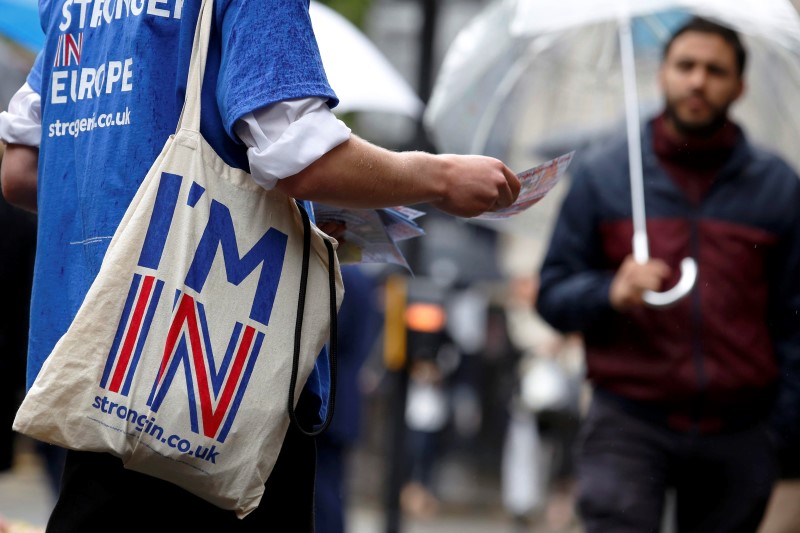By Elisabeth O'Leary
EDINBURGH (Reuters) - Two opinion polls on Monday suggested support for Britain staying in the European Union had recovered some ground following the murder of a pro-EU lawmaker, but a third poll found support for a "Brexit" ahead by a whisker.
Britons vote on Thursday to decide whether to quit the bloc they joined in 1973, a choice with far-reaching economic and political consequences for Britain and the whole of Europe.
Earlier on Monday, as expectations grew that Britain would stick with the status quo, the pound had its biggest one-day rise in seven years.
Separately, George Soros, the billionaire who bet against the pound in 1992, said a vote to leave would trigger a bigger, more disruptive devaluation in Britain's currency than the fall on Black Wednesday.
Campaigning had been suspended for three days after the killing of Jo Cox, a lawmaker and passionate advocate for Remain, led to soul searching about the campaign and its tone. Cox was shot and stabbed in her constituency.
An ORB poll for The Daily Telegraph newspaper found support for Remain at 53 percent, up 5 percentage points on the previous one, with support for Leave on 46 percent, down three points.
"All the signs of ORB’s latest and final poll point to a referendum that will truly come down to the wire," said Lynton Crosby, a political strategist who advised the ruling Conservative Party at the last national election in 2015.
The "Leave" camp had "failed to quash the almost ubiquitous perception that it is the riskier of the two options," he said.
Respected social research body NatCen also published a poll that found Remain on 53 percent and Leave on 47 percent, using a method that took on recommendations by an official inquiry into why pollsters got last year's election wrong and conducted from May 16 to June 12.
However, an online poll by YouGov for The Times showed Leave ahead on 44 percent, up one point, with Remain on 42 percent, down two points. That survey was conducted over the weekend after Cox was killed.
Jeremy Corbyn, leader of the Labour Party, said her murder was likely "extreme political violence."
Those wishing to stay in the bloc, including Prime Minister David Cameron, have focused on what they describe as the economic advantages provided by EU membership and the risks posed by leaving.
Those arguing to quit have focused on what they say are pressures on public services and jobs created by high immigration levels that cannot be reduced due to EU freedom of movement rules.
Sayeeda Warsi, a former co-chair of the Conservative Party, has switched her support to the "Remain" campaign because of the tactics used by the other side, she announced on Monday.
She pointed to a poster from one of the "Leave" campaigns, which used a photo of refugees walking through a field in Europe under the slogan "Breaking Point" - a message she said she did not want to form "the basis of the kind of Britain that I want to live in and to bring my kids up in".

Prior to the murder of Cox polls had shifted toward "Leave".